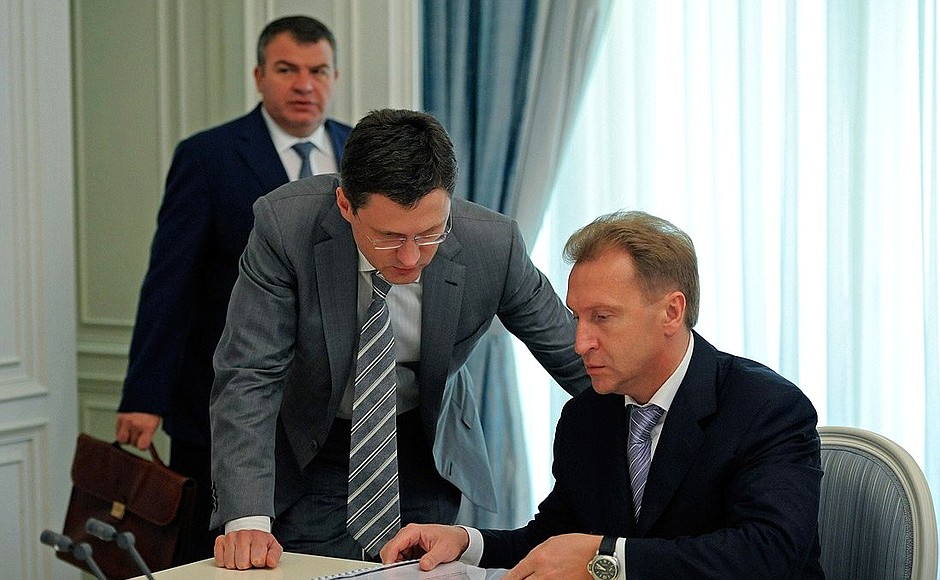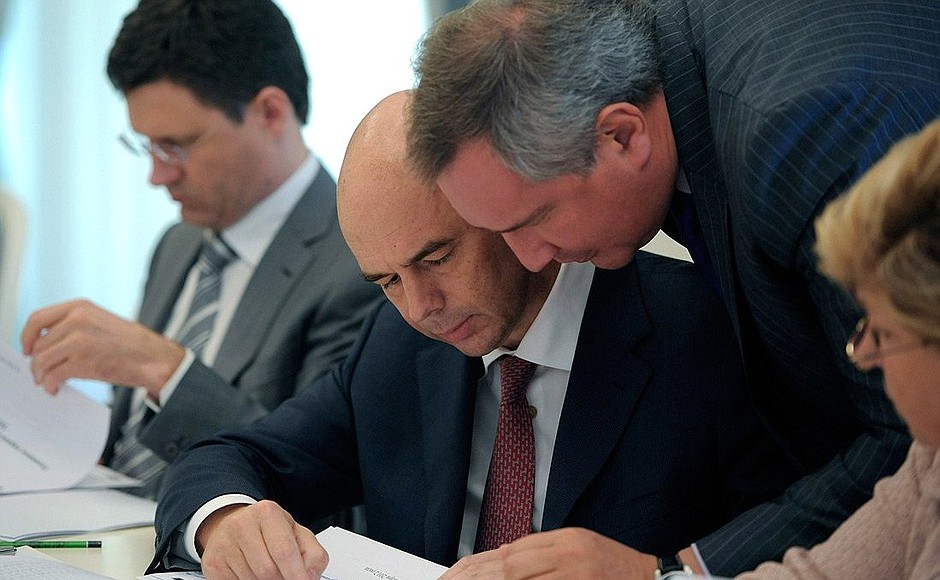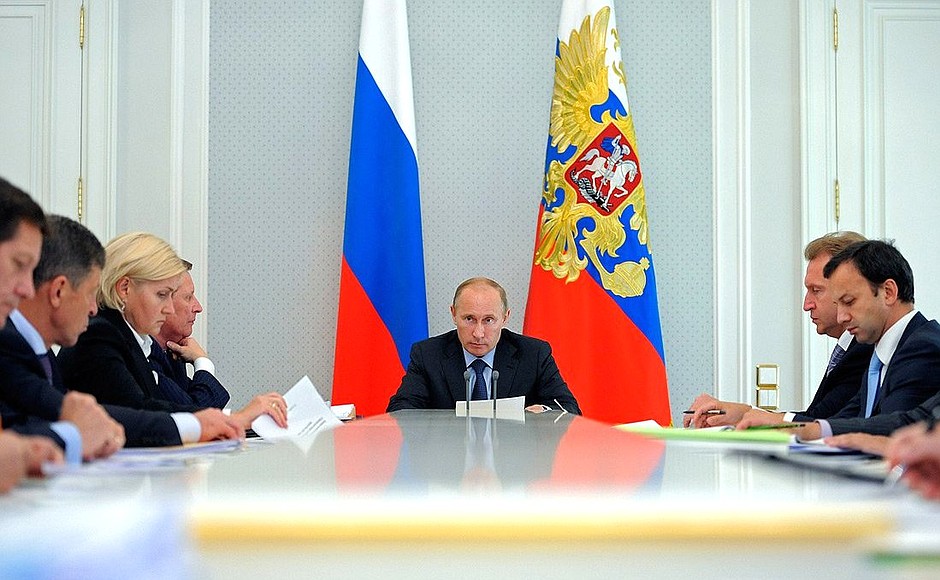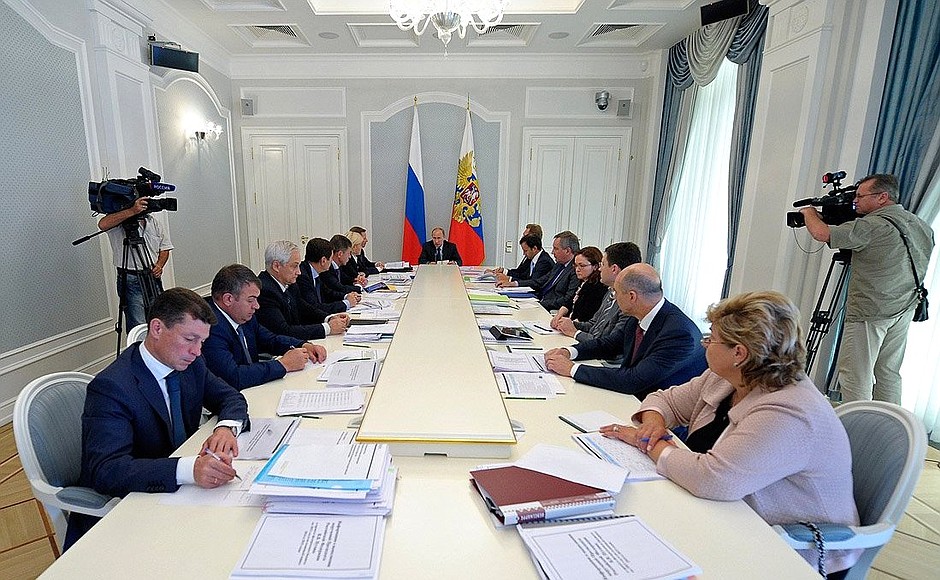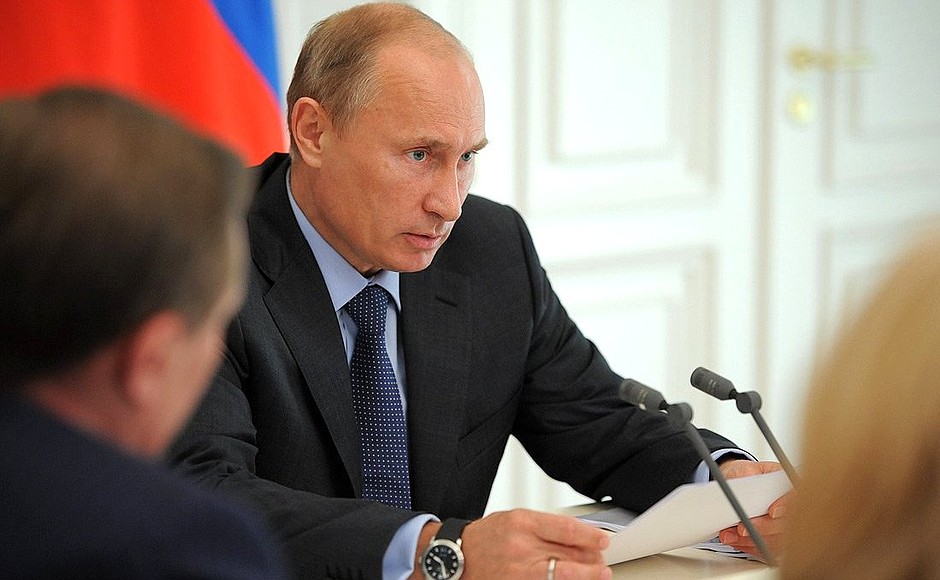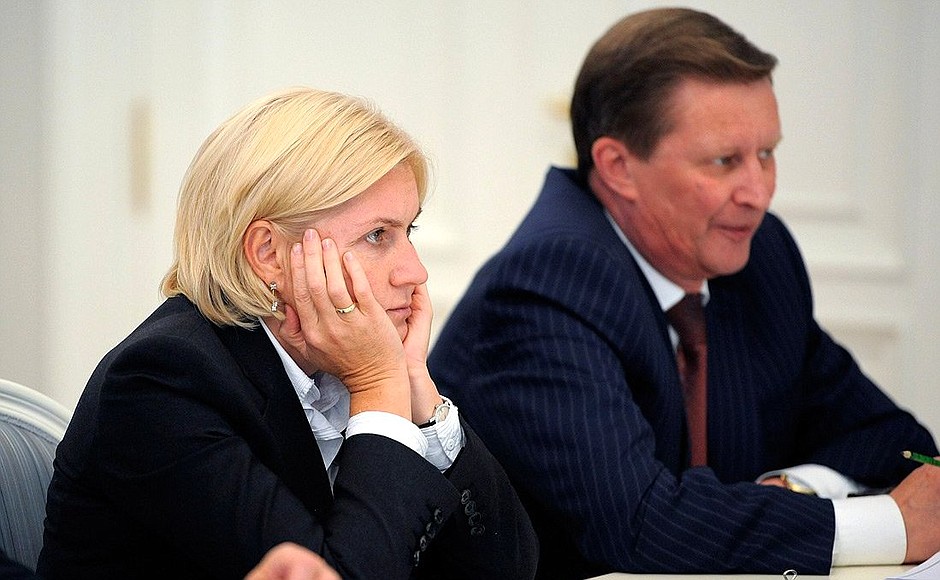* * *
President of Russia Vladimir Putin: Good afternoon, colleagues,
Today we'll talk about the progress made on drafting the federal budget. I know how hard it has been, especially in the present circumstances, however, we are to summarise the results, even if only interim results, because the work on the budget has entered its final stage.
Yesterday, the Finance Ministry submitted to the Government the draft budget for 2013 and the following two years, up to 2015 inclusive. In the near future the budget should be reviewed and then submitted to the State Duma. Experts at ministries, various agencies and the Government have certainly accomplished extensive and serious work. The challenge was to resolve a number of interrelated tasks, to calculate the basic parameters of the budget taking into account the complex processes in the world markets and the general instability in the global economy.
I know that there were involved debates and discussions on a number of budget planning issues. In fact, it was the same in the previous years, and we all know it well. Today I would like to hear what decisions you have arrived at as a result of your discussions, but first of all I would like to draw your attention to some fundamental issues and approaches.
First, we should strictly abide by the policy of balancing the budget. Tough and responsible fiscal policy is paying off, and if it is not done properly, then the results are also tangible but their nature is completely different. All of us realise this and we know this from the example of many of our neighbours, especially in the Eurozone. Against the background of the problems with public finances in many European and other countries, the situation in Russia looks stable.
Last year, the federal budget was planned with a 0.8% surplus. In the first eight months of this year, the dynamics has been positive on the whole. At the same time, we have significantly expanded our reserves. The latest figures show that the Reserve Fund, for example, has increased by approximately 150% and reached nearly 2 trillion rubles [over $64 billion].
However, the non-oil and gas revenues deficit remains high: the figure is estimated at over 10% in the current year – 10.6% of GDP. We often return to this issue and we must admit that the potential risks are very high in this area.
It was in order to improve long-term budget stability and to strengthen macroeconomic stability that the new budgetary rule was adopted. It is envisioned to reduce the negative impact of the current fluctuations and create additional opportunities for budgetary manoeuvre: the accumulation of reserves.
”The fulfilment of our social commitments must remain a priority. All the decisions have already been made and these tasks must be implemented, including the transition to a new, effective system of wages in the key budget spheres: education, healthcare, culture and science.“
This brings us to the second important task: the application of the budget rule limits the spending of the oil windfall, which is certainly reasonable and we have agreed on this many times. However, we must also take into account the key national objectives and the regions’ interests and needs, and properly evaluate our priorities in the economy, social policy – I am referring to pensions in particular – education, healthcare, culture, infrastructure, road construction, defence and security. Moreover, the fulfilment of our social commitments must remain a priority.
Please note that all the decisions have already been made, we have agreed on this on many occasions, the challenges have been identified in the Presidential Executive Orders, which I will talk about separately, and these tasks must be implemented, including the transition to a new, effective system of wages in the key budget spheres: education, healthcare, culture and science. These systems must be such that they encourage specialists and the management of institutions to improve professional standards and introduce structural adjustments, and to raise salaries for those who deserve it.
Next. As we analyse the federal budget, we must clearly understand what resources the major extrabudgetary funds will have, as I have already mentioned, in particular, the Pension Fund, the Federal Compulsory Health Insurance Fund, the Road Fund and others.
What date is it today? The 18th. And what have we agreed? That by the end of September the Government will submit written proposals on the development of the pension system. We haven’t received anything yet. How are you planning the budget for next year and the following years without addressing one of the key challenges facing the economy? We will talk about that today.
You must also pay special attention to the long-term budget planning. We need an idea of what the budget perspective is for the period after 2015.
Fourth. It is evident today that efficiency is a paramount requirement that applies to all parts of the budget. I ask all my colleagues and all those who are involved in decision-making to look once again what can be done to improve spending efficiency, returns on the investment of budget funds and a clear hierarchy of sectoral priorities. Structural changes must go hand in hand with funding, as I said earlier.
We must continue to work on improving the executors’ fiscal discipline, to minimise situations where the expenditure planned for the year under state programmes is not fully achieved and is carried forward from one year to the next. This creates an additional burden on state finances, jeopardising the timely implementation of the planned measures.
In closing, I want to come back to the basic macroeconomic conditions. Despite the current problems, it is essential that we continue a firm, consistent policy of suppressing inflation. It is an illusion that we can relax control over inflation a little in order to address current issues, including during budget planning. This is a very dangerous approach. As we know, low inflation is good because it means secure incomes, affordable loans and mortgages, and long-term investments.
The Government’s task is very complex since we must take the greatest care to pass safely between Scylla and Charybdis: we must draft a development budget as we fulfil our social obligations. We must implement the tasks we have set – and I say we because the Presidential Executive Orders of May 7, 2012 were drafted and adopted with your participation. At the same time we must keep macroeconomic indicators at the present level and work on improving them.
I would like to say a few words about those executive orders. We have said many times, and I warned from the outset that these executive orders must not remain on paper. They should be reflected in the practical efforts of the Russian Government. I have talked about it many times with almost everyone present here, as well as those who are absent today.
After all, the majority of people in our country are closely monitoring the domestic political situation and the plans announced by the country's leadership, and they are waiting for us to implement the tasks set out in those executive orders. We cannot allow a situation when the executive orders and the major, fundamental goals they set are one thing, and the activities of the executive branch are another. We must not and will not allow this, I say this straight away. The executive orders outline priorities for every policy area.
I want to draw your attention to the fact that unfortunately, there have been systemic failures on a number of positions. As for the development of Siberia and the Far East, the executive orders stipulate drafting proposals to accelerate socioeconomic development of Siberia and the Far East, such as improving transportation to remote areas, and so on. The agencies responsible for this include the Regional Development Ministry, which is a key agency in charge of this task together with the Economic Development Ministry and the Finance Ministry.
Next task: submitting proposals for the introduction of new personnel policy principles in the civil service with regard to ensuring an appropriate level of salaries in higher education. The agencies responsible include the Labour and Social Security Ministry jointly with a number of other agencies, but the Labour Ministry is in charge of this effort.
Next, the introduction of soft mortgages for certain categories of borrowers, and then everything down the list (there is a long list) – and again the agency in charge is the Regional Development Ministry. Those tasks set out in the executive orders have simply not been implemented and no proposals have been drafted.
”It is essential that we continue a firm, consistent policy of suppressing inflation. Low inflation is good because it means secure incomes, affordable loans and mortgages, and long-term investments.“
This is followed by the instructions, which are also set out in the executive orders, and our colleagues in the Government have made an initial attempt to tackle them, though I believe a purely formal one, without really trying to master these tasks.“it is essential that we continue a firm, consistent policy of suppressing inflation. It is an illusion that we can relax control over inflation a little in order to address current issues, including during budget planning. This is a very dangerous approach. As we know, low inflation is good because it means secure incomes, affordable loans and mortgages, and long-term investments.“
Another issue deals with drafting and submitting to the State Duma a bill on amendments regarding the development, adoption and application of professional standards – the agency in charge is the Labour Ministry; the development of measures to provide housing for families with three or more children, including the creation of the necessary infrastructure is to be supervised by the Regional Development Ministry jointly with regional and municipal authorities, and so on.
Colleagues, I would like to say the following in this regard: I have been working for many, many years with those present as well with the Government members who are absent today. Some of you were deputy ministers in the past or department heads, other held senior posts in the Presidential Executive Office, but the Minister’s job involves a personal responsibility for the sector. If one aspect of what had been planned is not implemented, the Minister will bear personal responsibility for that.
I will not take any decisions myself in view of the existing reporting order but I want to draw the Prime Minister’s attention to the need to reprimand the Regional Development Minister and the Labour Minister. I want you to know that this is nothing personal.
But I want to warn all the other Government members: I will closely monitor our joint efforts and take appropriate action in response to the steps you are taking or not taking when you should be. That is the first part.
There is also the second part. What is it? I have closely examined the proposals set out in the draft budget, and I want to say straight away that, as I said in the beginning, it is a hard, complicated, extensive and very demanding job. We have done it together with many of you in this room, so I know how hard it is.
But if we leave the draft as it is, the other tasks set in the executive orders will not be implemented either – I can see it already – but they must be implemented. Therefore I propose that today we hold a serious and painstaking discussion on the issues we have met here to talk about.
<…>
